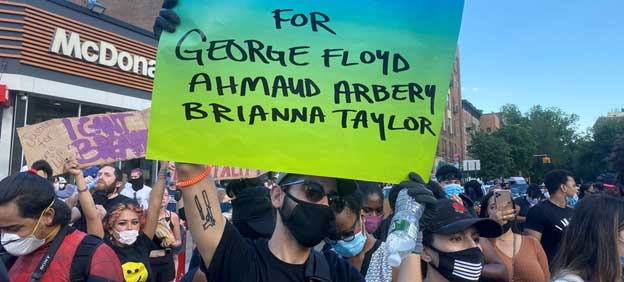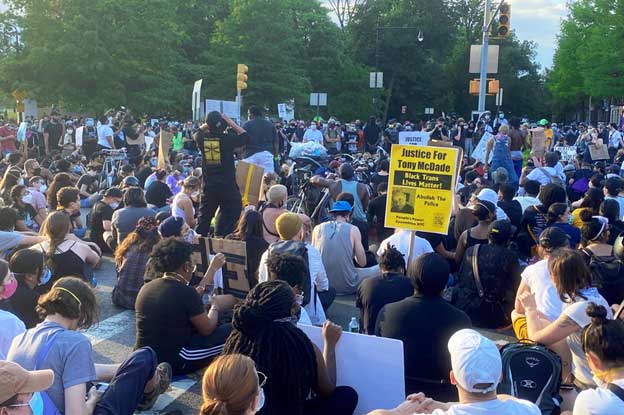The Need, Within the UN, for an Honest Conversation on Racism
Antonio Guterres, UN Secretary-General in an address to staffers at a Town Hall meeting

Protests against police brutality have been taking place in cities across the United States including in New York city. Credit: UN News/Shirin Yaseen
UNITED NATIONS, Jun 10 2020 (IPS) - I want to once again express to all colleagues my enormous appreciation, my enormous gratitude, for your fantastic professionalism, your flexibility and the way you have been able to fully deliver for the people we care for during this period.
And to say that as we hopefully approach a moment in which we might return to normality, that we will do it very carefully and in a phased way, because the safety and the well-being of the staff will be the primary consideration.
But of course, today we are gathered for another reason. I felt compelled to give you my testimony in these dramatic moments. We are all shocked by the brutality of the murder of George Floyd.
And we are all impacted and concerned, with lots of events that followed that we have been very attentively looking at. And I think it’s important to recognize that the center of these is a serious question of racism. Now, racism is abhorrent, nasty, and must be rejected everywhere at any moment, condemned in a clear way.
Racism is the rejection of our common humanity, which is a central aspect against the Charter of the United Nations. So, something that justifies the Charter of the United Nations is the fight against racism.
But I think we need to go a little bit further, and to look into this from an ideological perspective, from an economic and social perspective, and also from a perspective of relations between police, governments and people.
First, the ideological perspective. We are unfortunately entering a phase that some have called the post-enlightenment. Enlightenment is a European concept largely but I think the values of the enlightenment — the primacy of reason, tolerance, mutual respect — are common to many civilizations and many cultures around the world.
And indeed, it is as if these values are now being put dramatically into question. It is nationalism, it’s irrationality, it’s populism, it’s xenophobia, it is racism, white supremacism, it is different forms of Neo-Nazism, that are apparent in our societies.
And it is clear that in the center of these drives to irrationality, there is racism, and many other things have racist components. We have been fighting a lot against antisemitism and anti-Muslim hatred. And in antisemitism and anti-Muslim hatred, there is a racist dimension.

Protesters in Brooklyn, New York, peacefully demonstrate about racial injustice. Credit: UN News/Shirin Yaseen
So, racism is in the center of many other things that we deal with and fight against. It’s important to recognize that this is an ideological battle, in which it is essential to assert our values, the values of common humanity, the values of the Charter, equality, non-discrimination, mutual respect, and the capacity to support all the movements that fight for these values that are also deeply linked to the affirmation of human rights.
Now, if racism is something that exists everywhere, racism also exists within the United Nations. This is another aspect that I would like to underline today. We have very robust policies in relation to discrimination, harassment, abuse of authority.
There was recently a review of those policies that are in the SG bulletin. But we have not paid enough attention within the Organization to the specific question of racist bias and racist discrimination. Of course, there is a general question of diversity and inclusivity.
When we try to fight sexual harassment, the most important instrument is gender parity. When you try to fight racism, the most important instrument is to have regional diversity and inclusivity in our work. But this is general and of course we are fighting for it.
But we need to go deeper. I think we need to have within the United Nations an honest conversation on racism. We have some instruments already that were decided. We have the “united in respect” dialogues. We have the inclusion dialogues.
But these are, again, generic. We need to have something specific. I asked the Ombudsman together with the human resources department to prepare, in articulation with the staff representatives, a plan of action for a one-year debate on racism within the Organization, aiming at conclusions that, obviously, I want to listen to and be able to act upon.
I would like to have a chapter on racism in the next staff engagement survey to see if we are able to make progress or not in this regard.
My idea is for there to be a free-flowing discussion. I want people to feel totally at ease through the Ombudsman offices, through the civility café, through inviting experts to come and do TED talks and through debates that are organized. I’ve seen the staff engagement survey, I know that some feel that there is not enough respect within the Organization, that they can’t freely express themselves because they are afraid.
I want this debate to be a clearly open, free-flowing debate without any restriction, and I’m very much interested in participating. There is also a social and economic dimension in all of this, the central question of inequality in society, the central question of discrimination in society.
And it is clear that diversity is a richness, not a threat. The societies that are diverse can only succeed if there is a massive investment in social cohesion, by governments, local authorities, civil society, churches, against discrimination and inequality.
This is central to our 2030 Agenda, and this is central to the Sustainable Development Goals, and central to the values of the United Nations. So, our values are not only related to the questions of racism as a human rights violation, they are central to the questions of inequality and discrimination.
And these are vital in the perspectives of the work we do in relation to the 2030 Agenda and to diversity. We also need to understand that when we have situations in which social cohesion does not exist, where social protection is not enough, and where we have different forms of discrimination, there are grievances: those grievances have a legitimate right to be expressed in societies.
And for that demonstrations are something that is perfectly normal. It is our role to ask for demonstrations to be peaceful and at the same time to ask authorities to listen to the grievances and for police forces and others to be restrained in the way they handle these situations.
And this is very much at the center of what we have been saying in relation to the recent events and other similar ones around the world. And this brings us to the question of police brutality. One of the central problems that we are witnessing, and it’s very general, it’s not only police brutality, it is the difficulty of many authorities to deal with diversity.
The most obvious aspect, which is less evident, but many colleagues have already felt it, is the so-called profiling. But more dramatic than that is, of course, the police brutality in itself. We have seen a murder, but there are many other forms of police brutality that we see around the world, expressing racism.
Police forces need to be fully trained on human rights. Many times, police brutality is the expression of the frustrations of the police officers themselves, as well as of the lack of adequate psychosocial support to them.
Now the UN positions have been clear. The Human Rights High Commissioner has spoken. I have also been very clear in all my messages. Of course, many colleagues would like to be much more vocal and active, and we have the limitations of being International Civil Servants.
But there is one thing that we all can do, which is to spread the UN messages. This can be done by everybody with the tools at their disposal. All of us can multiply and amplify our messages against racism, our message against police brutality, our messages against the inequalities and discriminations that lead to situations like the ones we live in, fully asserting our values.
And I’d like to say that I count on our colleagues and on the staff representatives to help us organize an effective internal discussion on racism. Because I think we need to look deeply into it. And we all need to look into ourselves, into our prejudices and do everything possible to eradicate these aberrations from us and from the societies around us.
- ADVERTISEMENTADVERTISEMENT


IPS Daily Report







